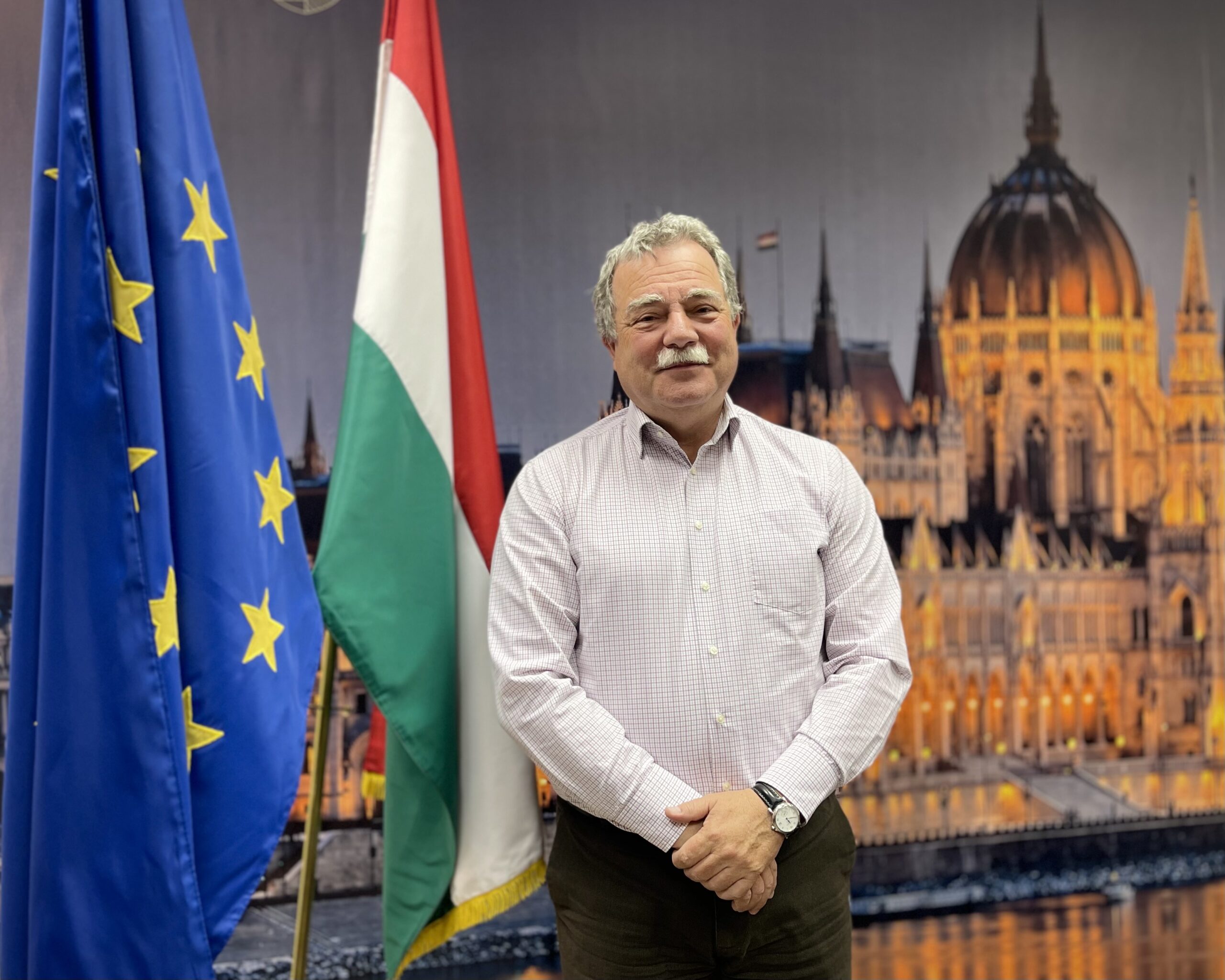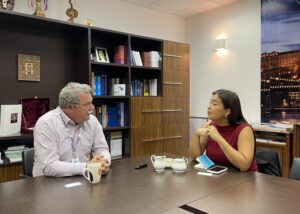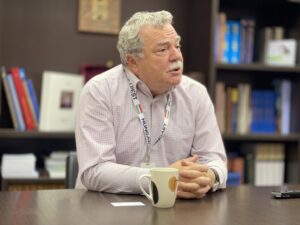ASTANA – Hungarian Ambassador to Kazakhstan Otto Ivan Rona touted the strong bilateral ties and the 10th anniversary of a strategic partnership agreement with Kazakhstan in an interview with The Astana Times.

Otto Ivan Rona. Photo credit: Aruzhan Ualikhanova/ The Astana Times
In June, Kazakhstan and Hungary marked ten years since they signed an agreement on strategic partnership. The past few years saw a series of high-level visits. In November 2023, Hungarian Prime Minister Viktor Orban visited Kazakhstan. In the same month, Deputy Prime Minister and Minister of Foreign Affairs of Kazakhstan Murat Nurtleu visited Budapest to hold the Strategic Council meeting with his counterpart, Deputy Prime Minister Mihály Varga.
“The bilateral relations between Kazakhstan and Hungary, concerning political ties, are just excellent. A very important role plays the understanding of our relativeness,” said Rona, who began his mission in Kazakhstan in January 2022 and presented credentials to President Kassym-Jomart Tokayev in February 2022.
“Both Hungarians and Kazakhs are nomad people. (…) Kazakhs very often call us the westernmost Kazakh tribe and I do love it. It is a very interesting formulation,” he added.

The ambassador and journalist Assel Satubaldina during the interview. Photo credit: Aruzhan Ualikhanova/ The Astana Times
Cooperation between Hungary and Kazakhstan can also be seen as a good example of Hungary’s eastern opening policy.
While commending political contacts, the ambassador suggested more should be done to boost economic ties. “We have a lot to do in that area because the wonderful political relations are not reflected in our economic ties. Both President Tokayev and Prime Minister Orban agreed on the necessity of finding so called flagship projects that would push further our bilateral ties,” said Rona.
According to him, Orban’s visit sparked a “very proactive attitude” among Hungarian businesses.
“When businesses themselves find ways to interact, that is the most wonderful situation or position because then they really smell money, and that is good. That is an exact push towards the enhancement of our bilateral business ties,” said Rona.
Flagship projects
One of the flagship projects is MOL Group’s involvement in the Rozhkovskoye gas-condensate field in western Kazakhstan, 60 kilometers from Uralsk. It partners with Kazakhstan’s KazMunayGas Exploration Production, and Chinese Sinopec in its joint operational company, Uralsk Oil and Gas, owning a 27.5% share.

Otto Ivan Rona began his mission in Kazakhstan in January 2022. Photo credit: Aruzhan Ualikhanova/ The Astana Times
In December 2023, the company started gas production from the U-21 well located in the field. The recoverable gas and condensate from the reservoir amount to 158.8 million barrels of oil equivalent, with gas accounting for 101.5 million barrels and condensate for 57.3 million barrels.
“There could be problems on the road to achieving a common result because this is a concession of KazMunayGas, Sinopec, and MOL, but we are able to find decent solutions and resolutions in order to call it a win-win game,” said the ambassador.
Rona revealed some other flagship projects in the process.
“There are very interesting and ongoing negotiations of a major Hungarian company to establish at least five animal fodder premix production facilities in Kazakhstan, both in the north and south of the country. This is a major step as we have never been on the Kazakh market in this area before,” he said, emphasizing the significance of these developments for Hungarian businesses.
The diplomat also mentioned that efforts are underway to bring a major Hungarian firm into Kazakhstan’s road toll collection system, expressing hope for tangible results from these negotiations. Additionally, he highlighted Hungarian companies’ interest in renewable energy production, particularly in smaller-scale solar energy projects in northwestern Kazakhstan and the possible reconstruction of hydroenergy power stations in southern Kazakhstan.
“Hungarian companies are to establish, not very far from Astana, an agricultural technological farm. I hope I will be personally there for the ground-laying ceremony in early September this year,” said Rona. The farm will focus on elite seed production and freshwater aquaculture.
He also spoke about the potential return of the well-known Hungarian Ikarus bus company to Kazakhstan, this time with electronic buses in cooperation with an Australian bus maker, aiming to provide green transportation for people in the country’s south.
Not satisfactory trade
Speaking of trade, the ambassador said the data is a “little bit disappointing.” According to the data from the Bureau of National Statistics of Kazakhstan, in 2023, the volume of mutual trade between Kazakhstan and Hungary reached $187.5 million, a 9% increase from $172.2 million in 2022.
Regarding trade, Rona noted some discrepancies in statistical data between Hungary and Kazakhstan. While Kazakhstan’s data shows $187.5 million for 2023, Hungary’s data shows a different figure of $565.7 million.
The ambassador also noted that in the first quarter of 2024, bilateral trade saw a 96% drop in Kazakh exports to Hungary while a 24% increase in Hungarian exports to Kazakhstan. He said crude and crude oil-related products “were missing” from the Kazakh exports in the first three months of this year.
“I can’t tell you the reason for the drop, but I am very much hopeful that it will pick up in the second half of the year and reach a good result by the end of the year,” he said.
Kazakhstan can supply Hungary with 95 different types of goods worth nearly $700 million with a potential to expand the export of metallurgy, petrochemicals, mechanical engineering, agriculture and construction products. This is what President Tokayev stated at a media briefing as part of Orban’s visit to the country in November 2023.
Investment opportunities
When asked about investment opportunities in Kazakhstan, Rona shared positive insights on doing business in the country, emphasizing the country’s commitment to international rules.
Since 2005, Hungarian companies have invested nearly $344 million in the Kazakh economy, data from the National Bank of Kazakhstan indicates. Nearly 70 companies with Hungarian participation are registered in Kazakhstan.
“There is a very serious and rule-based attitude in Kazakhstan concerning doing business with the outside world. This is very encouraging and good,” he stated, adding that Hungarian companies have positive impressions of their Kazakh partners. “Hungarian businesses kept telling me that it is not so easy to establish yourself on the Kazakh market, but once you are there, you can count on years-long successful activities with your businesses, and that is promising.”
He hopes that Kazakh companies share this view as they move towards Hungary.
“Alageum Electric [a Kazakh company specializing in the production and development of electronic components and systems] is in negotiations in Hungary to build a transformer plant. This is very good news. We are very happy to see that. (…) Mediker [healthcare provider in Kazakhstan] is also contemplating to build a major health company and center in Budapest, the Hungarian capital,” said Rona, highlighting the support from relevant Hungarian authorities to assist these businesses.
Among other success stories are a $100 million private equity fund established by Equilibrium Capital, a Hungary-based investment fund, at the Astana International Financial Centre (AIFC), and the strong presence of Gedeon Richter, a Budapest-based major pharmaceutical company, in Kazakhstan.
“Other than pharmaceuticals, we export high-tech health electronic products to Kazakhstan. Electronica 77 LLC is very active in that. As I told you, we are trying to introduce a different approach towards the Kazakh market, or even towards Kazakhstan as such, being really a hub of Hungarian businesses in the Central Asian region and being one of our major, if not the major, trading partners in that area,” said Rona.
Hungary’s presidency at the European Council
Hungary assumed the rotating six-month presidency of the European Council on July 1. Although Hungary’s presidency program does not include a specific Central Asian agenda, Rona emphasized the potential to address key regional issues.
“We can do a lot, especially in the so-called visa facilitation issue, which is high on the agenda in Kazakhstan,” he stated. He assured that Hungary would make every effort to advance this initiative throughout its presidency.
“We are living in a momentum that we should utilize. This would enhance Kazakhstan and the EU’s relationship and bring closer our peoples, which is very important. The Hungarian EU presidency will do its utmost to push this process further onwards to its hopefully not-that-far-away successful end,” said Rona.
The Stipendium Hungaricum program is a great success
Hungary provides Kazakh students with 250 scholarships annually via its Stipendium Hungaricum program. This year, the number of applicants from Kazakhstan reached a staggering 1,981.
Launched in 2013 by the Hungarian government, the program aims to attract top international students to Hungarian higher education institutions by offering them the opportunity to pursue undergraduate, master’s, and doctoral degrees in various fields.
“The Stipendium Hungaricum program is undisputedly a great success,” said the ambassador, noting Hungarian universities offer bilingual, trilingual, and quadrilingual English, German, French, and Hungarian studies.
He also mentioned that Hungary has an alumni program to maintain contact with graduates, which Rona described as “small ambassadors” of Hungary.
“This is a super project, and we are supporting it very much,” he said, adding that the program was recently extended until the end of 2027 through an agreement signed in November 2023 by Hungary’s Minister of Foreign Affairs and Trade Peter Szijjártó and Kazakhstan’s Minister of Science and Higher Education Sayasat Nurbek.
Relativeness and World Nomad Games
The ambassador shared a story that happened to him in May 2022, six months after he began his mission. He and his spouse drove out of Astana, around 60 kilometers from the capital. “We stopped our car and there is the Nura River, a wonderful place with a superb view,” he said, recounting their enjoyment of bird songs and the sight of wildflowers, including wild tulips.
Suddenly, a small car approached them on the non-asphalt road. “A young Kazakh opened his window and asked me if I knew where the road led,” he shared. After explaining that they were not locals and were from Hungary, the young man switched off his engine, got out, and hugged him, saying, “Bratya Madyari” (Brothers Madjars). The ambassador described this moment as “very much touching.”
“That simply shows that in an average Kazakh, there is a real feeling of relativeness, and that is wonderful,” he said, noting that this sense of connection makes his life in Kazakhstan very easy and enjoyable.
Regarding nomadic traditions, Rona noted that Hungary regularly organizes the National Kurultai, a significant gathering of nomadic people. “This year, from Aug. 9 to Aug. 11, there will be a huge gathering, and even Kazakhs very often attend with huge delegations,” he said, describing it as an event filled with sports, culture, cooking, and a celebration of shared history and roots.
The ambassador also mentioned the upcoming fifth World Nomadic Games in September in Astana. “I count on a Hungarian delegation. I do not know how big that will be, but I honestly hope for Hungarian participation in the various competitions,” he concluded.

